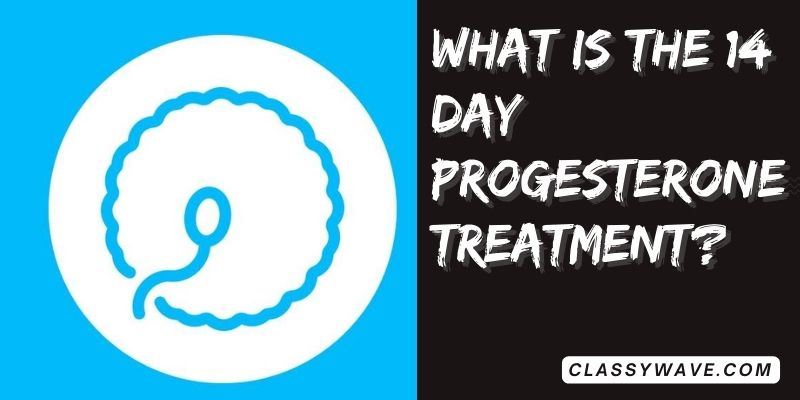What is the 14-day progesterone treatment? Considerations
Embarking on exploring 14-day progesterone treatment unveils a comprehensive landscape of considerations. From medication interactions to the intricate effects on hormonal patterns, adaptability across life stages, and addressing fertility concerns, each facet plays a pivotal role. This guide delves into these nuanced aspects, offering insights to empower informed decisions.
Understanding 14-Day Progesterone Treatment
The 14-day progesterone treatment is a therapeutic regimen involving the administration of progesterone, a hormone crucial in reproductive health, for a specified duration. This protocol is often employed to address hormonal imbalances, menstrual irregularities, and fertility issues. Understanding its purpose, mechanism of action, and potential benefits is essential for individuals considering or prescribed this treatment.
Conditions Treated and Dosage Guidelines
A 14-day progesterone regimen is commonly used to address conditions such as irregular menstrual cycles, amenorrhea, and hormonal imbalances. Dosage guidelines vary based on the specific medical condition, patient characteristics, and treatment goals. Healthcare professionals carefully tailor the dosage to achieve optimal results while minimizing potential side effects, ensuring safe and effective treatment.
Side Effects and Risks
While generally well-tolerated, 14-day progesterone treatment may have side effects, including changes in mood, bloating, and breast tenderness. Understanding these potential risks is crucial for individuals undergoing the treatment. Healthcare providers assess the overall health of the patient and monitor for any adverse reactions, making adjustments as needed to optimize the balance between benefits and risks.
Effectiveness and Success Rates
The effectiveness of a 14-day progesterone treatment varies based on the underlying condition being addressed. Success rates are often influenced by factors such as patient adherence, the severity of the hormonal imbalance, and individual responses to the treatment. Research studies and clinical data contribute to understanding the expected outcomes and informing healthcare professionals in assessing the treatment’s efficacy.
Comparing Progesterone Treatment Durations
Evaluating the effectiveness of a 14-day progesterone treatment involves comparing it to alternative durations. Some conditions may benefit from shorter or longer treatment periods. Understanding the comparative advantages, disadvantages, and specific indications for different treatment durations guides healthcare professionals in tailoring the most suitable regimen for individual patient needs.
Considerations for Hormonal Imbalance
Hormonal imbalance underlies various reproductive health issues, and a 14-day progesterone treatment addresses these imbalances. Considering factors such as the menstrual cycle, fertility goals, and overall hormonal health is crucial. Tailoring the treatment to address specific hormonal concerns ensures a comprehensive and individualized approach to restoring hormonal balance.
Consulting Healthcare Professionals
Initiating a 14-day progesterone treatment requires consultation with healthcare professionals. This step involves discussing medical history, symptoms, and treatment goals. Healthcare providers assess the appropriateness of the treatment, provide detailed information on the procedure, and address any concerns. Open communication ensures that patients are well-informed and actively involved in decisions about their reproductive health.
Patient Experiences and Testimonials
Insight from patient experiences and testimonials offers valuable perspectives on the 14-day progesterone treatment. Hearing about the real-life impact, challenges, and successes provide individuals considering the treatment with additional information. Patient narratives contribute to a more comprehensive understanding of what to expect, fostering informed decision-making and enhancing the patient’s overall experience.
Research on 14-Day Progesterone Efficacy
Ongoing research contributes to understanding the efficacy and potential advancements in 14-day progesterone treatment. Studies explore its effectiveness in different populations, optimal dosage adjustments, and potential innovations. Staying informed about the latest research findings ensures that healthcare professionals and patients benefit from evolving knowledge, contributing to improved treatment outcomes and patient care.
Medication Interactions with 14-Day Progesterone Treatment
Exploring potential interactions between 14-day progesterone treatment and other medications is crucial for patient safety. Certain drugs may affect the efficacy or safety of progesterone therapy, emphasizing the importance of healthcare professionals reviewing a patient’s complete medication profile before initiating treatment.
Hormonal Changes and Menstrual Regularity with 14-Day Progesterone
Delving into the impact of 14-day progesterone treatment on hormonal patterns and menstrual regularity is essential for understanding its therapeutic effects. This exploration aids healthcare providers in tailoring treatment plans to address specific hormonal imbalances and menstrual irregularities.
Adapting Treatment for Women in Different Life Stages
Recognizing the diverse needs of women in various life stages is crucial when implementing 14-day progesterone treatment. Adapting the treatment approach to accommodate age, reproductive goals, and overall health ensures a personalized and effective intervention.
Fertility Concerns: Role of 14-Day Progesterone Therapy
Addressing fertility concerns is a primary consideration in 14-day progesterone therapy. Understanding how this treatment impacts fertility, menstrual cycles, and reproductive health allows healthcare professionals to provide comprehensive guidance and support to individuals seeking to conceive.
Long-Term Monitoring for Individuals on 14-Day Progesterone
Long-term monitoring is essential for individuals undergoing 14-day progesterone treatment. Regular assessments of hormonal levels, menstrual patterns, and potential side effects contribute to the ongoing success and safety of the treatment, allowing for timely adjustments and personalized care.
Conclusion
In conclusion, navigating the complexities of 14-day progesterone treatment involves a nuanced understanding of its diverse aspects. From potential medication interactions to adapting to different life stages and addressing fertility concerns, individuals benefit from tailored approaches guided by healthcare professionals. Continuous monitoring ensures the long-term success and safety of the treatment. As the landscape of progesterone therapy evolves, staying informed empowers both healthcare providers and individuals to make well-informed decisions, fostering optimal outcomes in reproductive health and overall well-being.
FAQs
1. Question: How does 14-day progesterone treatment differ from other hormonal therapies?
Answer: Tailoring treatment duration and dosage distinguishes 14-day progesterone therapy. Consult healthcare professionals for personalized guidance.
2. Question: What are common side effects associated with 14-day progesterone treatment?
Answer: Side effects may include mood changes and breast tenderness. Regular monitoring and healthcare provider guidance mitigate potential issues.
3. Question: Can 14-day progesterone treatment affect fertility and menstrual cycles?
Answer: Yes, it can impact fertility and regulate menstrual cycles. Consult healthcare providers for fertility-related considerations and personalized guidance.
4. Question: Is it safe to combine 14-day progesterone treatment with lifestyle modifications?
Answer: Combining with lifestyle changes is generally safe. Consult healthcare professionals to ensure a well-coordinated and effective approach.
5. Question: How often should individuals undergo monitoring during 14-day progesterone treatment?
Answer: Regular monitoring is essential. The frequency depends on individual needs and treatment goals, as determined by healthcare professionals.







